
The Private World Of William Holden
Bill Holden was hard at work cleaning out the area behind his garage when he suddenly spotted hundreds of empty beer cans dumped into the compost pile.
“This called for a little investigation,” he said, “so I got hold of the boys and questioned them.” It seems that his sons, Scott and West, and some of their pals had, for reasons known only to small boys, started to collect different kinds of beer cans. They had traveled all over the neighborhood asking for different brands. They’d even ridden their bikes over behind some restaurants and searched through the trash barrels. It was an impressive assortment. Once they had grown bored with the game, me ik they had simply dumped all the cans into the most convenient hole.
Bill had the boys gather up their empties and carry them outside for the rubbish collectors.
Early next morning when the North Hollywood garbage truck drove up, the garbage men were disillusioned.
“Must be more than 200 cans in that barrel,” one of them said, with proper awe.
“Yeah,” said the other. “And all this time I’m thinking those Holdens are a nice moderate family.”
Well, the garbage men were right the first time. The Holdens are nice and they are moderate.
You wouldn’t be able to distinguish their home from any of the other nice, unpretentious homes on the street—except for the white Cadillac in the driveway and the extra-large pool.
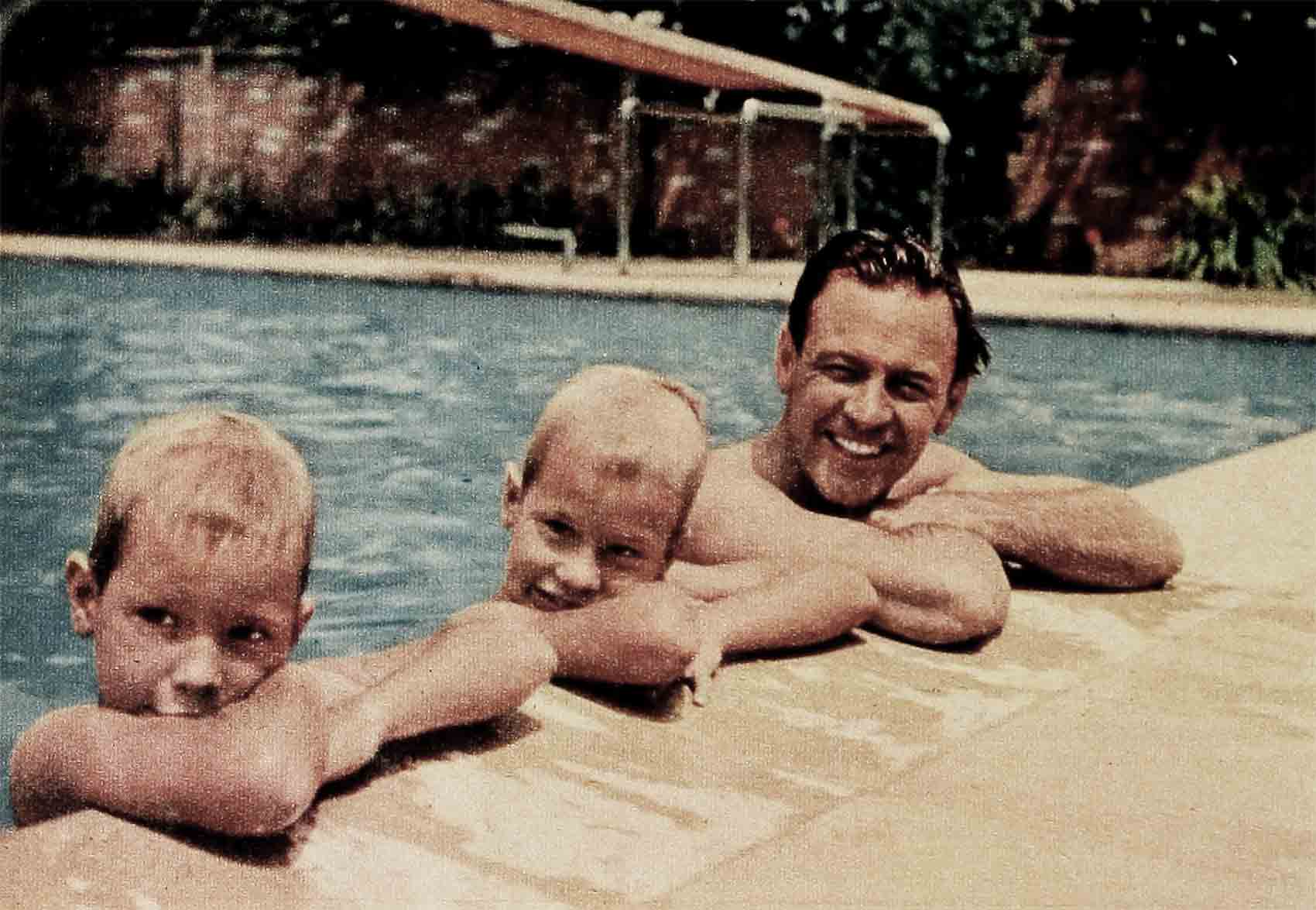
The Bill Holden swimming pool in North Hollywood is something of a community project. Bill has two boys and a girl who are always inviting the neighborhood gang in for a dip. That’s fine with Bill as long as he or his lovely wife, Ardis, is around to act as lifeguard.
A few Saturdays ago Bill volunteered for lifeguard duty. He had an appointment later in the afternoon so he didn’t bother to put on swimming trunks. He just sat on the sidelines watching the kids enjoy themselves, once in a while calling out a word of instruction.
When it was West’s turn to dive—West is Peter Westfield Holden, age ten—he announced ceremoniously that he was going to try a jackknife dive.
The husky little boy leaped off the board with-a good spring. He cut the water so cleanly it hardly rippled.. Bill Holden watched his son with pride. A few years back, before they had put in the pool, West didn’t know how to dog-paddle. Now he was diving like a junior champion.
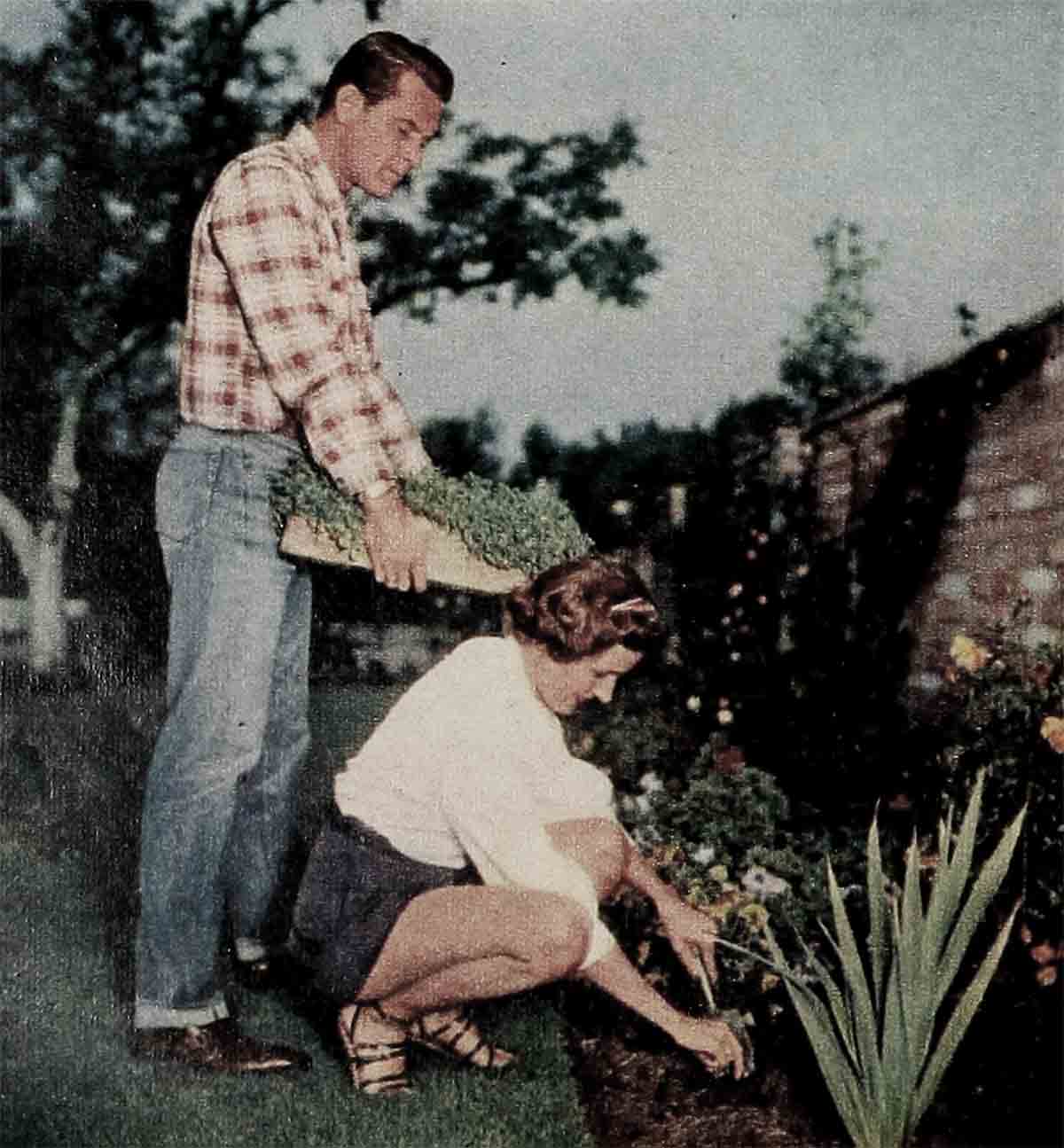
Suddenly Bill realized that West hadn’t come up for air. The other boys seemed to be watching the water anxiously.
Bill didn’t wait. He dived in, clothes and all. As he plunged to the bottom desperately searching for his son, he caught sight of West grinning and holding on to the drain. West pushed himself up to the surface and scampered out of the pool.
The act was a plot to get Bill into the pool with his clothes on.
Bill came up mad and sputtering.
“Don’t you ever do that again,” he warned angrily, trying to shake the water out of his watch. Quickly, the humor of his position dawned on him. And he laughed as loudly as the boys who went around North Hollywood for weeks telling about the “old gag Bill Holden fell for.”
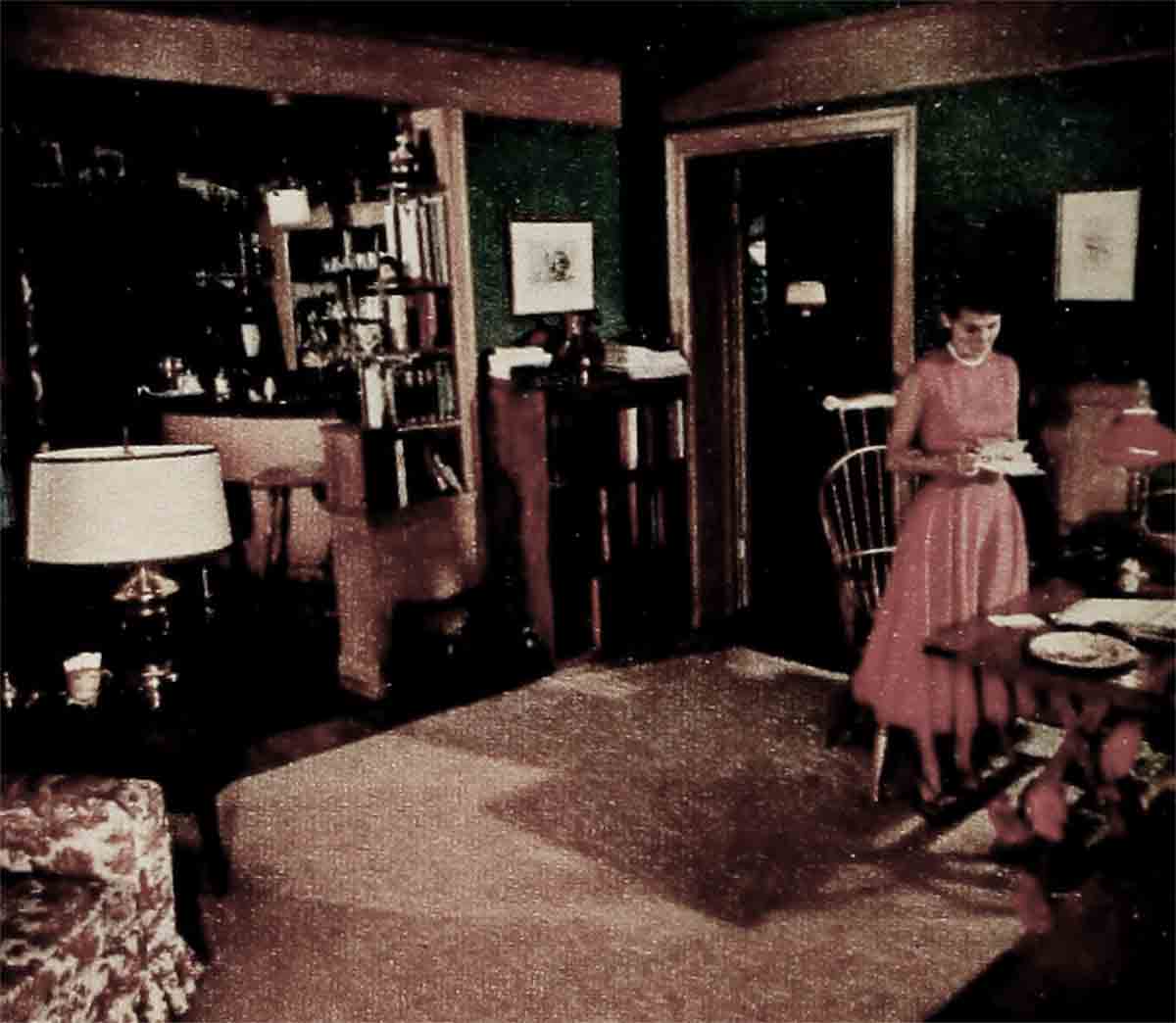
Then One Sunday afternoon the senior Holdens had to go to a cocktail party.
Bill called Scott in and placed him in charge of the yard.
“No one must use the pool,” Bill cautioned, “because Mother and I won’t be here to watch you.”
“What else is there to do?” Scott and West asked.
“There’s plenty else to do,” their father asserted. “Just remember. I’m putting you in charge of the yard. No swimming.”
A few hours later Bill and Ardis returned home to an ominous silence.
“Scott,” Ardis Holden called out. “West! Where is everyone?”
Hannah Reeves, the Holdens’ reliable housekeeper came running out of the kitchen, tears streaming down her cheeks.
“Hannah!” Bill demanded. “Where are the boys?”
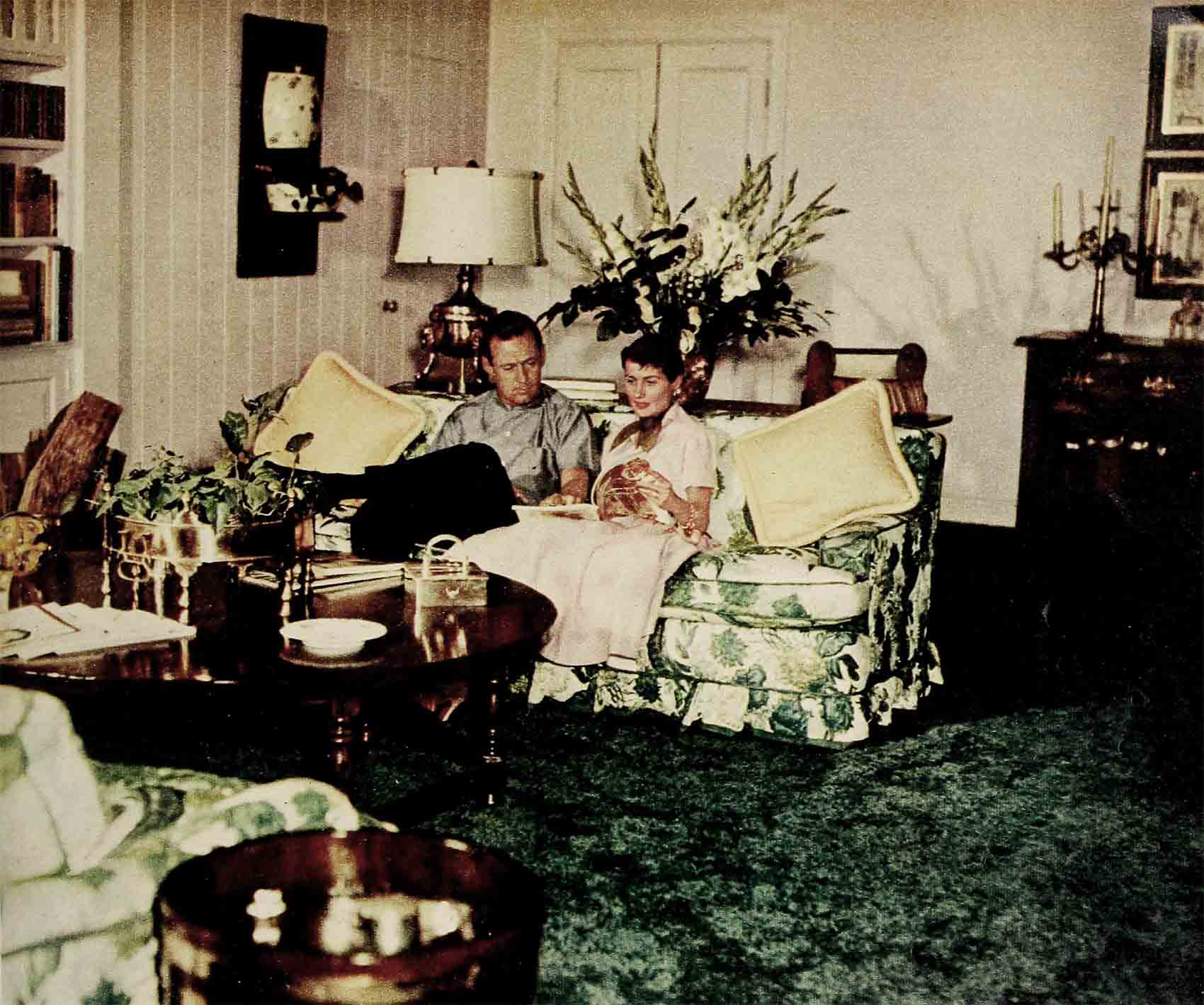
“Mr. West is in his room and Mr. Scott is in the hospital, I think,” Hannah answered.
Ardis was horrified. “What do you mean; you think Scott’s in the hospital? What’s happened?”
“Well, you told the boys not to go in the pool,” Hannah explained, looking at Bill, “and they didn’t. Instead Mr. Scott decided to walk on the brick wall. He fell and broke his arm. Mr. Lerner from next door took him to the emergency hospital.”
Ardis turned to her husband. “Oh, Bill,” she sobbed. “Why didn’t you just tell them to go ahead and swim?”
Bill threw out his arms and turned his face skyward in the traditional stance of the martyr.
“I,” he said, “am blamed for everything.”
You can see that Bill Holden’s family life is just about typical of upper middle class life in America.
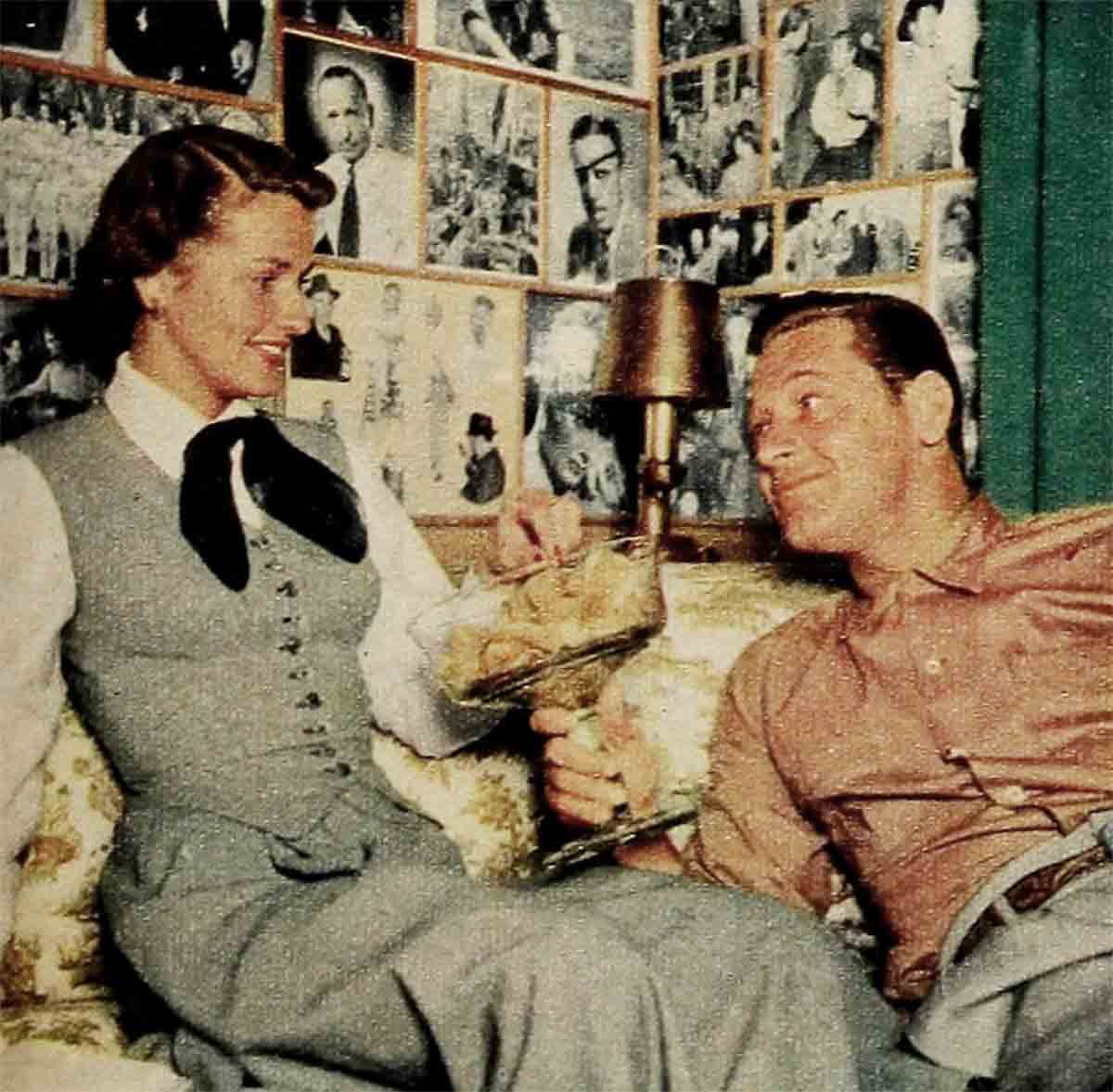
Of course the Holdens have more money than most people. But the windfall is relatively recent. It hasn’t been so long since Bill was making fifty dollars a week at Paramount.
There is nothing ostentatious about the Holdens. Their way of living is simple.
An actor’s house is probably more indicative of his values than any other tangible thing. The Holden house is a solid, unpretentious stucco and stone job designed for growing children and harried parents. It is located in North Hollywood which is not so fashionable as Beverly Hills, Bel Air, Holmby Hills or Brentwood. That doesn’t disturb handsome Bill.
“When Ardis and I were first married,” Bill explains, “we bought a little six-room house. It was neat, cheap and very comfortable. But our family increased.” In addition to Dee-dee (Ardis’ daughter Virginia by a previous marriage) there were two sons, Scott and West, born during World War II.
“With the passing of every week,” Bill continued, “the kids seemed to grow bigger and bigger. Soon it became a question of getting a bigger house or suffering a nervous breakdown.”
“You can say that again,” Ardis interjected. “We were pretty close to living on top of each other, So Bill and I got up one morning and decided that the next thing on the agenda was house-shopping.
“Well, we started looking and it was quite a job. We didn’t want to get in too deep, financially speaking, and yet we needed a spacious place.
“Most of the homes we looked at lacked something or other—closet space, yard space—or the rooms were too small. Bill just can’t abide small or low-ceilinged rooms. He likes them big and open.”
It wasn’t until they walked into the home of Leon Errol, the famous stage and screen comedian, that Bill and Ardis felt they’d found the place. This two-story English country house on a quiet dead-end street in a family neighborhood fulfilled their every need.
Upstairs are three complete bedroom suites. The largest went to the boys. Deedee has her own bedroom and bath, and Bill and Ardis took the end rooms so that they might convert a sunporch into a larger dressingroom for Bill.
Downstairs there’s a large, folksy livingroom and a smaller den. The Holdens spend most of their evenings in the den. As Hollywood stars go, they are not particularly social.
“Frankly,” Bill confesses, “we’re not members of the Hollywood party set. I don’t see much point to those big wingdings filled with noise and smoke. As far as I can see, they’re run on the basis of taking your wife and losing her for the evening. In the meantime you shout across the table to strangers. That’s not for me.
“In five years Ardis and I have gone to one premiére and the Academy Award presentations this past March.” (Bill won an Oscar for his performance in Stalag 17.)
Bill Holden loves people but not publicity, and he refuses to patronize nightclubs and stylish restaurants just to have his picture taken. In the last three years he has starred in ten major films. That makes him Hollywood’s busiest actor.
“At the end of a day,” Ardis explains, “he’s really beat. He gets home after seven, usually, and then he freshens up. I guess we eat later than most families do.
“When dinner’s over Bill likes to sink into his favorite leather chair. It’s in the den beside the fireplace. He turns on a background of recorded music and we talk. He tells me about the day’s shooting and all the crazy incidents that happen at the studio. I bring him up to date on the mail and the bills and what’s new in the life of two Cub Scouts.”
A unique feature of the Holden house is a picture-gallery bar which adjoins the den. This was one of the delightful extras that first caught Bill’s eye. The bar used to be lined with an amusing collection of Leon Errol photos. Now, some eight years later, two sides of the room Holden shots, but there are still dozens of frames left to be filled.
“As a matter of fact,” Ardis says, “I’m seriously considering painting over the walls and getting a simple scrapbook for our pictures. The trouble with this gallery is that you’ve got to get pictures the right sizes to fit the various frames. Then the glass comes out and has to be held in place while the frames get nailed back.
“Don’t quote me, but Bill’s not very handy and lots of times he hammers his thumbs and breaks the glass and gets thoroughly aggravated.”
Another distinctive part of the Holden house is the outside stairway that leads to the second floor. When the real. estate agent was showing Bill the house for the first time she pulled the kind of boner that could have cost her a sale.
“Just think, Mr. Holden,” she suggested, “when you have an early-morning call you can tiptoe out of the house without disturbing a single soul. And sometimes,” she added coyly, “you can slip in without anyone’s seeing you.”
Bill shook his head violently. “There’ll be no tiptoeing in this house, in or out. Do you understand?”
The agent was silenced and Ardis started to giggle.
“If a man gets up early and goes to work,” Bill carried on, “and I’m that man, then I want the rest of the family to know about it. I want ’em to know that I’m working long and hard for a living.”
Bill meant that. He’s an early riser who sings in the shower and stomps down to breakfast. He doesn’t like to eat alone.
Since they bought their house the Holdens haven’t made any basic changes. They have added a pool on the extra lot that adjoined their property and recently Bill installed a high fidelity music system. But that’s about all. The rooms were furnished slowly.
“We’ve tried to stay with the 18th Century English,” Ardis says, “because it’s informal and it’s solidly built. All but two of our wooden pieces in the livingroom are genuine antiques so you can see they’ve passed the test of time. There’s not a table that will suffer if you put your feet on it. Most of them came out of English taverns. There’s really nothing the boys can break or destroy—no fragile bric-a-brac, no delicate fabrics.”
Bill Holden maintains the strong conviction that no dinner party should include more than eight people—if you really want to enjoy your guests. With this thought firmly in mind, their decorator imported an oak diningroom table from England and specified “only eight chairs.”
Asked what one thing he likes best about his home, Bill had a funny answer. “Sunday afternoon,” he said. And what he enjoys about Sunday at home, oddly enough, is what is known in the, Army as “policing the area.” This is a general cleanup in which the boys work with Bill, sweeping out the garage, hosing down the walls, gathering up old magazines and empty bottles—and, on occasion, beer cans. When the job is done, they all go for a swim.
It may not sound to you like a movie star at play, but in the private world of Bill Holden the quiet family life is the good life.
THE END
—BY MARVA PETERSON
(William Holden can now be seen in Paramount’s Sabrina.)
It is a quote. MODERN SCREEN MAGAZINE SEPTEMBER 1954





No Comments